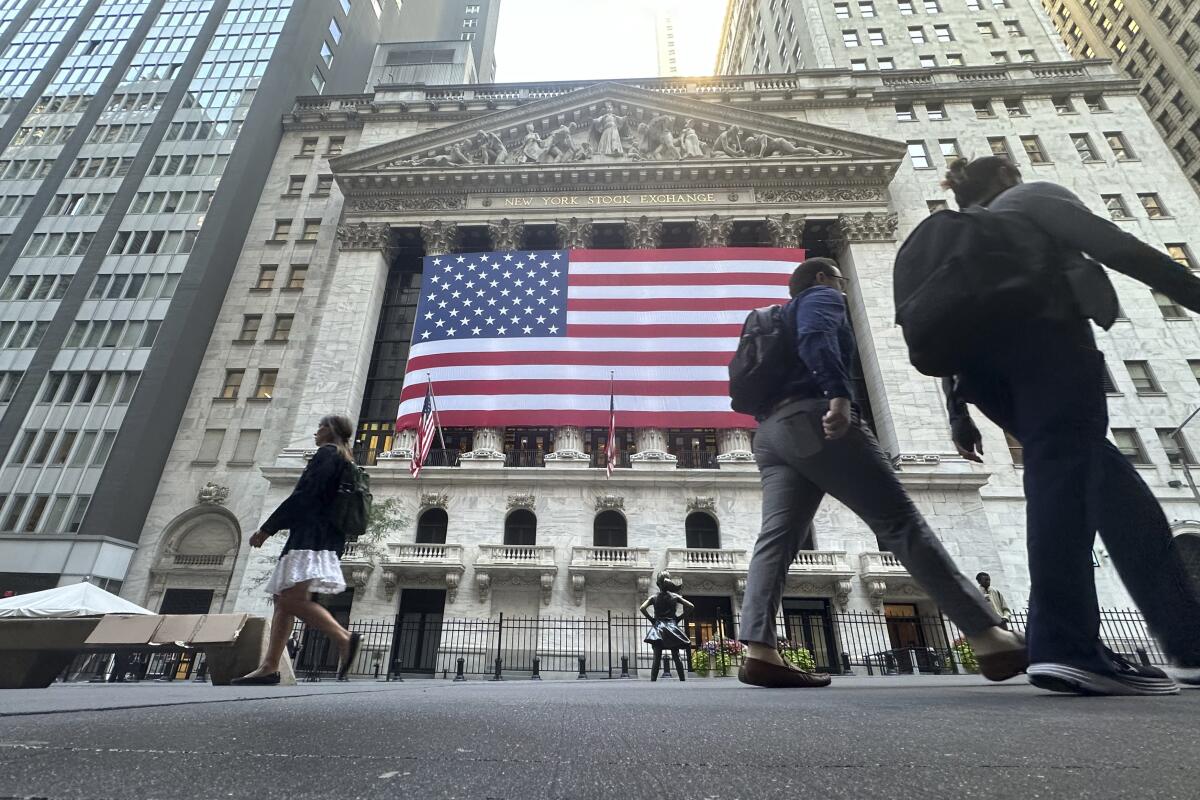Dow sets a record as Wall Street gears up for a cut to interest rates

- Share via
NEW YORK — The Dow Jones industrial average set a record after a quiet Monday of trading, as Wall Street geared up for the most anticipated meeting of the Federal Reserve in years.
The Dow rose 0.6% to surpass its previous all-time high set a few weeks ago. The Standard & Poor’s 500 index, which is much more comprehensive and widely followed on Wall Street, ticked up by 0.1% to climb within 0.6% of its own record set in July.
The Nasdaq composite slipped 0.5% as big technology stocks and other market superstars gave back a bit of their big gains from recent years.
Most stocks rose on Wall Street, and Oracle’s gain of 5.1% helped lead the market. The software company continued a strong run that began last week with a better-than-expected profit report.
Alcoa jumped 6.1% after saying it would sell its ownership stake in a Saudi Arabian joint venture to Saudi Arabian Mining Co. for $950 million in stock and $150 million in cash. But drops for some influential Big Tech stocks kept indexes in check, including declines of 2.8% for Apple and 1.9% for Nvidia. They’re among the market’s most influential stocks because they’re among the largest by market value.
Stock indexes have been taking a jagged, scary ride toward their records. After worries about the U.S. economy and other hiccups in global markets briefly sent the S&P 500 nearly 10% below its all-time high last month, the S&P 500 is just one middling day away from its record on excitement about coming cuts to interest rates.
Treasury yields eased in the bond market ahead of Wednesday’s meeting for the Federal Reserve, which is expected to cut its main interest rate for the first time in more than four years.
The only question is how much relief for the economy the Fed will deliver. Traders are shifting more bets toward a larger-than-usual move of half a percentage point, according to data from CME Group. They’re expecting a 63% chance the Fed will go beyond the traditional cut of a quarter of a percentage point. That’s up from 50% on Friday and just 30% a week ago.
The difference between a half-point cut and a quarter may sound academic, but it can have far-ranging effects. Lowering rates relieves pressure on the economy, but it can also give inflation more fuel.
The Federal Reserve has been keeping its main interest rate at a two-decade high in hopes of slowing the economy enough to stifle high inflation. With inflation having eased substantially from its peak two summers ago, the Fed has said it can focus on bolstering the slowing job market and economy. Some critics say it may be moving too late, increasing the risk of a possible recession.
A Fed cut of half a percentage point would probably be the best case for the stock market in the very short term, according to Michael Wilson and other strategists at Morgan Stanley. But that’s only if the Fed can convince investors it’s not getting forced into a bigger-than-usual cut because of worries about a recession, among other factors.
The more important thing over the next three to six months will be how well the job market holds up, Wilson said. If employment weakens, stocks could fall regardless of whether the Fed cuts by half or a quarter of a percentage point Wednesday.
In the bond market, the yield on the 10-year Treasury fell to 3.62% from 3.66% late Friday. The two-year yield, which moves more closely with expectations for the Fed, eased to 3.56% from 3.59%.
That was despite a report in the morning showing manufacturing in New York state returned to growth. That surprised economists, who were expecting another month of contraction for an area of the economy that’s been hit hard by high interest rates.
On Wall Street, Carl Icahn’s Icahn Enterprises rose 14.5% after it said a U.S. judge dismissed a proposed class-action lawsuit against the company, one based on allegations by a research firm that looks for financial irregularities at companies and tries to profit when the stock prices fall.
Fertilizer producer Mosaic fell 3.6% after it said electrical equipment failures at mines and Hurricane Francine will reduce its production of potash and phosphate in the current quarter.
All told, the S&P 500 rose 7.07 points to 5,633.09. The Dow added 228.30 points to close at 41,622.08, and the Nasdaq composite fell 91.85 points to 17,592.13.
In stock markets abroad, indexes were mixed amid mostly modest movements across Europe and Asia. Hong Kong’s Hang Seng added 0.3% after data released over the weekend showed China’s economy slowed further in August.
Markets in Japan, mainland China and South Korea were closed for holidays.
Choe writes for the Associated Press. AP writers Matt Ott and Zimo Zhong contributed to this report.
More to Read
Inside the business of entertainment
The Wide Shot brings you news, analysis and insights on everything from streaming wars to production — and what it all means for the future.
You may occasionally receive promotional content from the Los Angeles Times.










